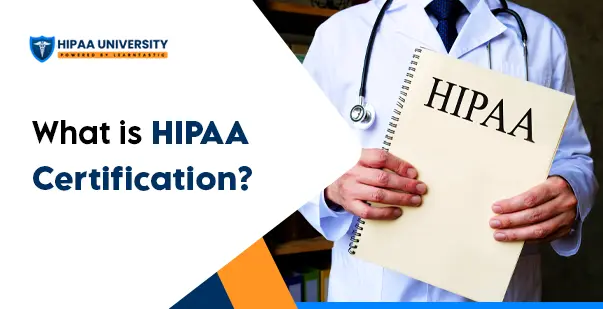What is HIPAA Certification?

August 7, 2024
HIPAA — short for the Health Insurance Portability and Accountability Act — is a federal law that sets national standards for safeguarding sensitive patient health information. It applies to a wide range of healthcare entities, including providers, health plans, clearinghouses, and even business associates that handle this data on their behalf.
While HIPAA compliance is mandatory, HIPAA certification is not. Certification is voluntary and usually involves an independent review or audit that demonstrates an organization’s commitment to following HIPAA’s privacy and security standards.
In this guide, we’ll take a closer look at what HIPAA certification means, who benefits from it, how it works, and why it matters more than ever.
What It Means to Be HIPAA Certified
HIPAA certification refers to the process a healthcare organization undergoes to demonstrate full compliance with HIPAA regulations — typically through an independent third-party audit.
HIPAA is a U.S. law that enforces strict standards around the privacy and security of protected health information (PHI).
To achieve certification, an organization must implement physical, administrative, and technical safeguards as outlined in the HIPAA Security Rule.
Once these are in place, an external auditor evaluates the organization’s systems and documentation to ensure they meet all requirements. If everything checks out, the organization is awarded HIPAA certification.
It’s important to understand that HIPAA itself does not issue certifications. Certification comes from qualified outside firms that specialize in HIPAA compliance.
Who Should Get HIPAA Certified?
Any organization that creates, handles, stores, or transmits PHI must follow HIPAA rules. While they are not legally required to be certified, many choose to pursue certification as a way to strengthen compliance, reduce risk, and prove their commitment to patient privacy.
Entities that benefit most from HIPAA certification include:
- Healthcare Providers
This includes a wide range of professionals and facilities — from physicians, dentists, and hospitals to mental health counselors, physical therapists, nursing homes, and home health agencies. If you provide care and handle PHI, you fall under HIPAA.
- Health Insurers
HIPAA regulations apply to all forms of health insurance, including private insurers, employer-sponsored plans, Medicaid, Medicare, COBRA, and health plans under the Affordable Care Act.
- Healthcare Clearinghouses
Clearinghouses convert nonstandard health data into standardized formats for transmission. They serve as data bridges between healthcare providers and insurance companies, and must also follow HIPAA rules.
- Business Associates
Business associates are third-party vendors that access or process PHI on behalf of covered entities. Examples include billing services, cloud storage providers, and IT consultants.
Although certification is optional, it can:
- Strengthen internal safeguards
- Pinpoint compliance gaps
- Reduce the chance of violations
- Boost patient trust
- Demonstrate accountability to partners and regulators
Key Benefits of Getting HIPAA Certified
Organizations that voluntarily go through HIPAA certification audits often see major advantages, including:
-
Identifies Weaknesses or Gaps in Compliance
Experienced auditors can uncover vulnerabilities in your current privacy and security systems. From missing documentation to inconsistent safeguards, these findings help you make meaningful improvements.
-
Lowers the Risk of Violations
By fixing those gaps and implementing best practices, you significantly reduce the likelihood of HIPAA violations — and avoid the chaos that follows a data breach.
-
Helps Avoid Fines
HIPAA violation penalties can be steep — up to $1.5 million per year, depending on the severity and intent. Certification supports your compliance and helps you stay off the radar.
-
Improves Patient Trust
When patients know you’re certified, they’re more likely to trust that their private health data is being handled with care.
-
Gives You a Competitive Advantage
Being HIPAA certified sends a strong message: you take compliance seriously. That can make a difference when partnering with other organizations or winning contracts.
-
Supports Internal Audits
An external audit supplements your own internal monitoring, providing a more complete picture of your HIPAA readiness.
While certification isn’t required, it’s increasingly seen as a best practice for healthcare organizations that want to maintain high standards.
Read also: What is Considered Protected Health Information Under HIPAA?
HIPAA Compliance Checklist
Getting certified means proving that your organization has met a specific set of standards across every area of HIPAA compliance. This includes:
-
HIPAA Security Officer
Appoint a qualified security officer responsible for managing HIPAA compliance. This person may also serve as the organization’s privacy officer, depending on your size and structure.
-
Risk Analysis
Conduct thorough risk assessments — at least once a year — to identify weaknesses that could lead to breaches or unauthorized disclosures of PHI.
-
HIPAA Policies
Maintain well-documented privacy and security policies that align with HIPAA requirements. This includes policies for handling PHI, breach reporting, employee access, and more.
-
Employee Training
Provide HIPAA training certification to all staff, tailored to their job roles. Training should occur at hire and be repeated annually, with special updates when policies or roles change.
-
Physical Safeguards
Secure your facilities, offices, and workstations. Restrict physical access to areas where PHI is stored or accessed.
-
Technical Safeguards
Protect PHI with strong digital measures, such as:
-
- Data encryption
- Multi-factor authentication
- Access controls
- Audit logs and system monitoring
-
Business Associate Agreements (BAAs)
Ensure all third-party vendors with access to PHI have up-to-date, HIPAA-compliant contracts in place.
Once these elements are implemented, your organization can move forward with a third-party certification audit.
HIPAA Certification: Step-by-Step Guide
Here’s what the full certification process typically looks like:
1. Conduct Internal HIPAA Risk Analyses and Audits
Start by reviewing your existing compliance practices. This helps identify gaps in physical, administrative, or technical safeguards that need improvement.
2. Remediate Any Gaps
Based on the findings, make updates to your policies, procedures, or infrastructure. Prioritize the areas that pose the greatest risk to PHI.
3. Appoint HIPAA Privacy and Security Officers
Assign one or more qualified individuals to lead your HIPAA program. Equip them with tools, authority, and HIPAA compliance training to carry out their responsibilities effectively.
4. Review and Update Documentation
Ensure your privacy and security policies, breach notification plans, and compliance logs are up to date and well organized.
5. Provide Organization-Wide HIPAA Training
Deliver comprehensive, role-specific training to all employees — from frontline staff to executives. Everyone should understand their responsibilities when it comes to HIPAA.
6. Contract With a Qualified HIPAA Auditor
Select a reliable third-party firm to perform your certification audit. Look for experience, references, and a clear scope of work.
7. Remediate Any Issues Identified in the Audit
If the audit reveals weaknesses, address them quickly. This may involve more training, tech upgrades, or documentation fixes.
8. Obtain HIPAA Certification
Once the auditor confirms your organization meets all HIPAA requirements, you’ll receive official certification.
Keep in mind that this certification represents compliance at a specific point in time. Ongoing effort is required to maintain that status.
How Much Does HIPAA Certification Cost?
HIPAA certification costs vary, depending on several factors:
- Size of your organization (staff count, locations)
- Complexity of your IT infrastructure and PHI systems
- Volume of PHI handled and stored
- Number of business associate contracts that require review
- Number of employees needing HIPAA training certification
Smaller practices may spend a few thousand dollars, while large health systems could spend significantly more. The key is understanding that costs scale with risk — and that certification helps protect against far costlier penalties.
Staying Compliant After Certification
Earning HIPAA certification is an achievement — but keeping it is where real diligence comes in. Here’s how to maintain long-term compliance:
- Conduct updated risk analyses annually to catch new vulnerabilities
- Offer ongoing HIPAA training to staff, including refreshers and updates
- Monitor for unusual activity in systems where PHI is stored
- Review and revise your HIPAA policies as your organization or regulations evolve
- Schedule new third-party audits every 2–3 years to stay current
- Run breach response exercises to test and improve your incident plans
By staying proactive, organizations can avoid backsliding — and stay protected long after their initial certification.
HIPAA Training: What to Know
One of the core expectations under HIPAA’s Privacy and Security Rules is training. Every employee who interacts with PHI must receive HIPAA training certification appropriate to their role.
This training should be delivered:
- At hire — for all new employees exposed to PHI
- Annually — for current staff, to refresh and reinforce key points
- When policies change — especially if procedures are updated
- After a role change — to reflect new responsibilities or data access
At a minimum, your training should cover:
- What counts as PHI
- When PHI can be shared (and when it can’t)
- How to protect PHI from unauthorized access
- How to report a suspected breach
Training records should be documented and retained for at least six years.
Read also: The HIPAA Minimum Necessary Rule Standard
What Happens If You Violate HIPAA
The Office for Civil Rights (OCR), part of the Department of Health and Human Services (HHS), enforces HIPAA. If OCR receives a complaint or breach report, it may launch an investigation into the organization’s compliance.
Here’s a quick look at potential penalties:
Civil Penalties
These are broken down into tiers based on severity:
| Violation Type | Minimum Fine | Max Fine per Year |
| Unaware | $127 | $63,000 |
| Reasonable Cause | $1,000 | $100,000 |
| Willful Neglect (Corrected) | $10,000 | $250,000 |
| Willful Neglect (Uncorrected) | $50,000 | $1,500,000 |
Criminal Penalties
When PHI is misused with intent, criminal charges apply:
| Level | Example | Penalty |
| 1 | Unauthorized access | $50,000 + up to 1 year in prison |
| 2 | Acquiring PHI through deception | $100,000 + up to 5 years in prison |
| 3 | Using PHI for personal gain | $250,000 + up to 10 years in prison |
Beyond fines and jail time, breaches can destroy an organization’s credibility — something far harder to recover.
Roadmap to HIPAA Success
HIPAA certification isn’t required, but it can make a powerful statement: we take data protection seriously.
More than just a checkbox, certification helps organizations:
- Improve their safeguards
- Earn patient trust
- Reduce risk
- And stay ahead of enforcement
But true HIPAA compliance is an ongoing effort. It takes regular training, proactive risk management, policy updates, and strong systems to keep PHI safe.





